Drip campaigns automate email sequences to engage your audience effectively. Whether you're a small business, e-commerce store, or content creator, choosing the right tool can make all the difference. Here's a quick overview of the top tools for 2025:
- HubSpot: All-in-one CRM and marketing platform, ideal for scaling businesses. Starts at $45/month.
- ActiveCampaign: Advanced automation and analytics for small to medium businesses. Starts at $29/month.
- Mailchimp: User-friendly and affordable for beginners. Starts at $13/month.
- Klaviyo: Tailored for e-commerce with advanced segmentation. Starts at $20/month.
- Drip: Focused on e-commerce with robust analytics. Starts at $39/month.
- ConvertKit: Best for content creators with simple automation. Starts at $9/month.
- GetResponse: Includes webinar tools and conversion funnels. Starts at $19/month.
- Sendinblue: Combines email, SMS, and chat marketing. Starts at $25/month.
- Mails AI: AI-powered campaigns with unlimited email accounts. Starts at $49/month.
Quick Comparison
| Tool | Starting Price | Key Features | Best For |
|---|---|---|---|
| HubSpot | $45/month | Full CRM, advanced workflows, A/B testing | Large businesses |
| ActiveCampaign | $29/month | Predictive sending, dynamic content, site tracking | SMBs focusing on engagement |
| Mailchimp | $13/month | Pre-built templates, time zone optimization | Startups and small businesses |
| Klaviyo | $20/month | E-commerce focus, predictive analytics | Online retailers |
| Drip | $39/month | Revenue tracking, custom workflows | E-commerce stores |
| ConvertKit | $9/month | Creator-focused tools, visual automation | Content creators |
| GetResponse | $19/month | Webinars, landing pages, segmentation | Agencies and educators |
| Sendinblue | $25/month | SMS, real-time reporting, dynamic lists | Multi-channel campaigns |
| Mails AI | $49/month | AI-driven campaigns, unlimited accounts | Sales teams and outreach efforts |
Each tool offers unique features and pricing to fit different business needs. Consider your goals, budget, and required integrations to find the perfect fit for your drip campaigns.
5 best email marketing platforms in 2025 | ActiveCampaign vs. Kit vs. Mailerlite
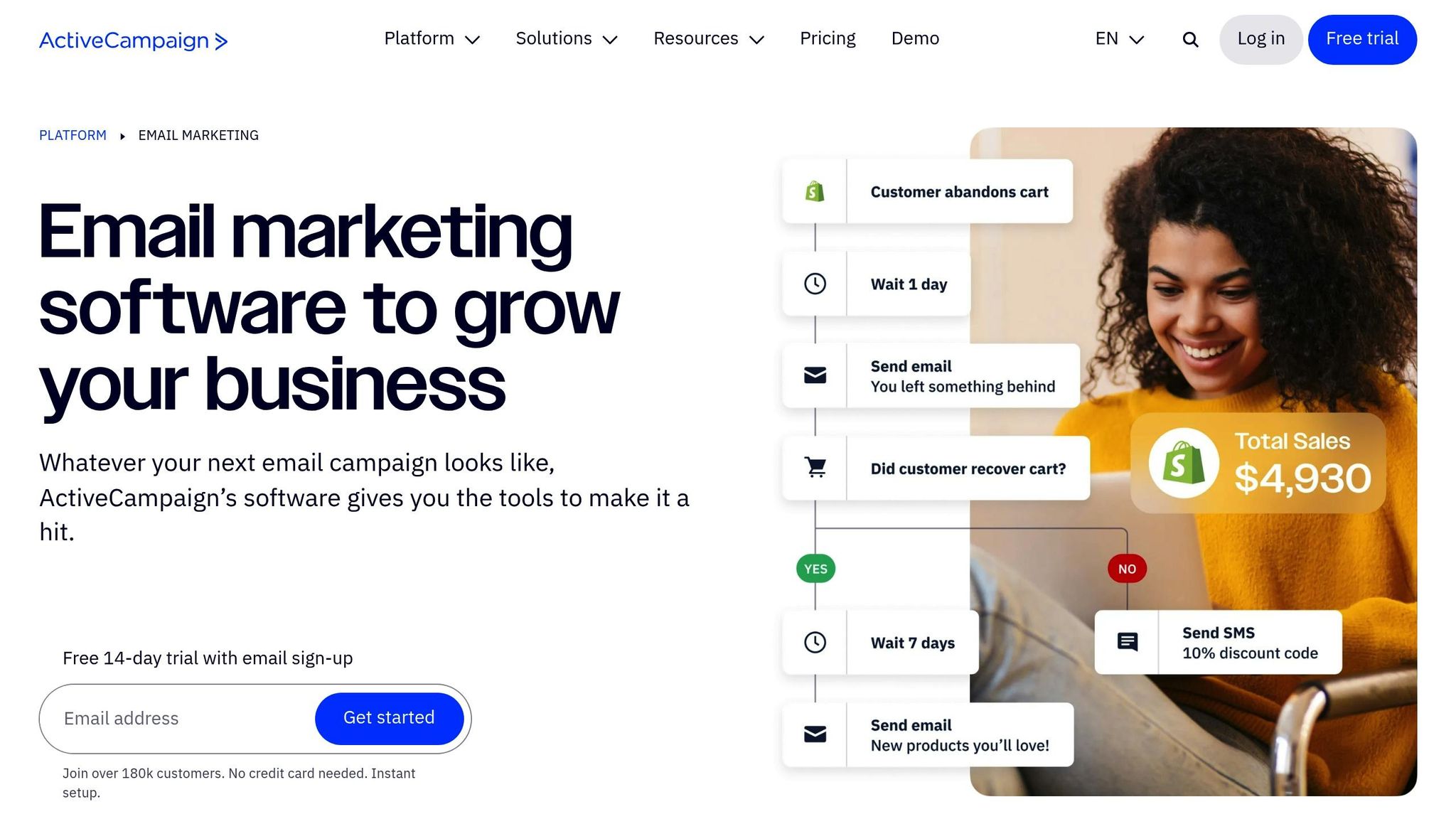
1. HubSpot
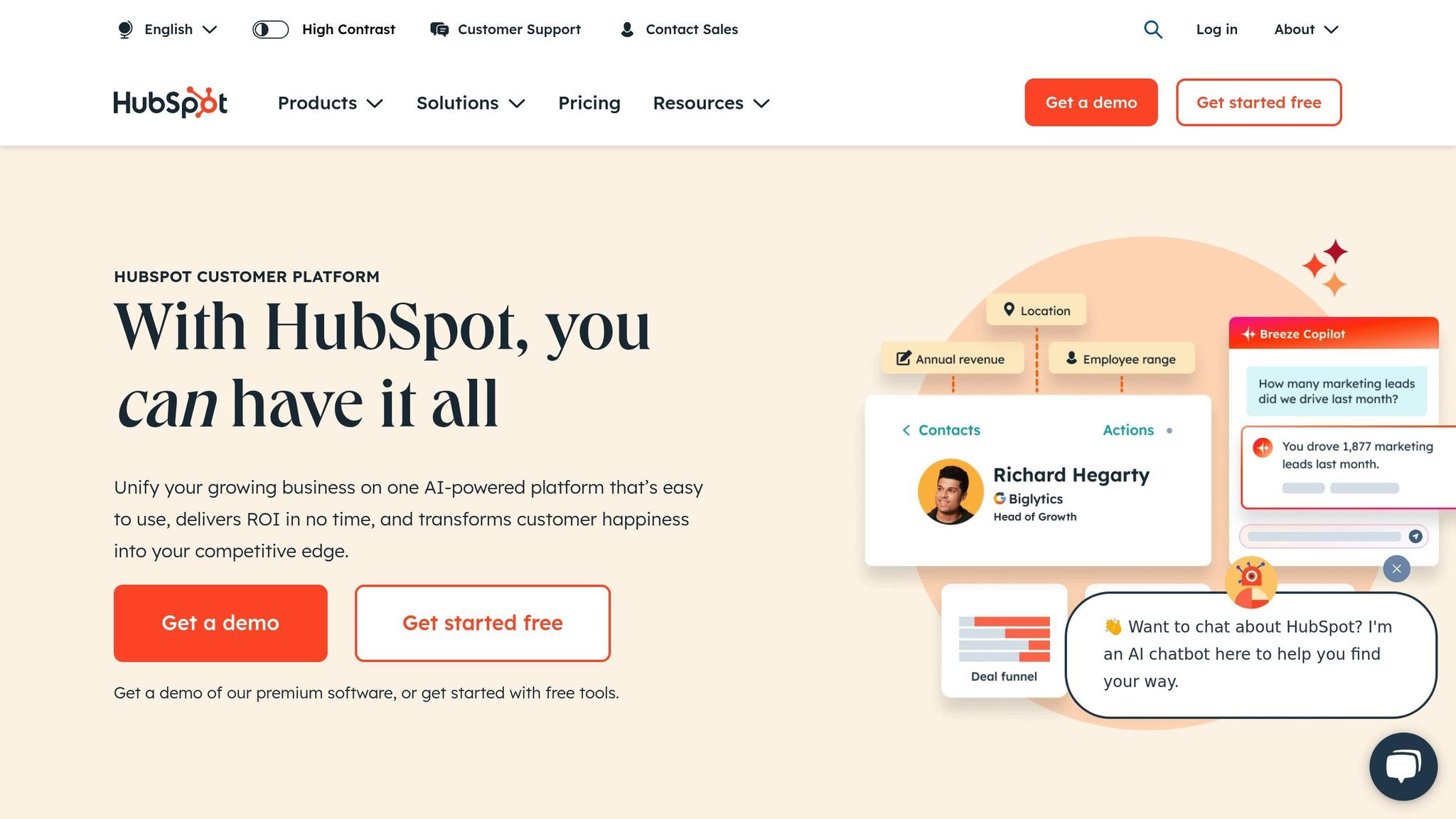
HubSpot is a powerful tool for drip campaigns, combining email marketing with its all-in-one CRM platform. It uses customer data from across its system to create targeted, well-timed campaigns, all within a connected ecosystem.
One of HubSpot's standout features is its ability to integrate marketing, sales, and customer service tools into a single platform. This eliminates the common headaches of syncing data between separate email tools and systems.
HubSpot also offers flexible pricing options. Whether you're just starting out with their free plan or need advanced features for a larger business, there's something for every stage of growth.
Ideal for:
- Mid-sized to large businesses
- Companies looking for an all-in-one CRM and marketing platform
- Teams prioritizing data-driven strategies
HubSpot grows with your business, making it a great choice for scaling operations. For more tools and insights, check out resources like Sales, Leads & CRM.
2. ActiveCampaign
ActiveCampaign stands out for its powerful automation and data tools, making it easy to create personalized email sequences that respond to subscriber behavior.
Key Automation Features:
- Predictive sending to ensure emails land at the best times
- Dynamic content tailored to individual recipients
- Multi-trigger workflows for complex automation
- Split testing with up to five variations
Pricing Plans:
- Lite: $29/month (1,000 contacts)
- Plus: $49/month (1,000 contacts)
- Professional: $149/month (2,500 contacts)
- Enterprise: Custom pricing available
The platform integrates effortlessly with CRMs, e-commerce systems, and social media tools, making it a strong choice for e-commerce businesses, B2B companies, agencies, and small-to-medium-sized organizations.
ActiveCampaign also provides detailed reporting, including metrics like open rates, click-through rates, workflow performance, revenue tracking, engagement scores, and even geographic data. These insights help fine-tune campaigns for better results. While it may take time to master due to its complexity, the platform offers live training sessions, thorough onboarding, and an extensive knowledge base to support new users.
Next, let’s take a closer look at Mailchimp’s strategy for drip campaigns.
3. Mailchimp
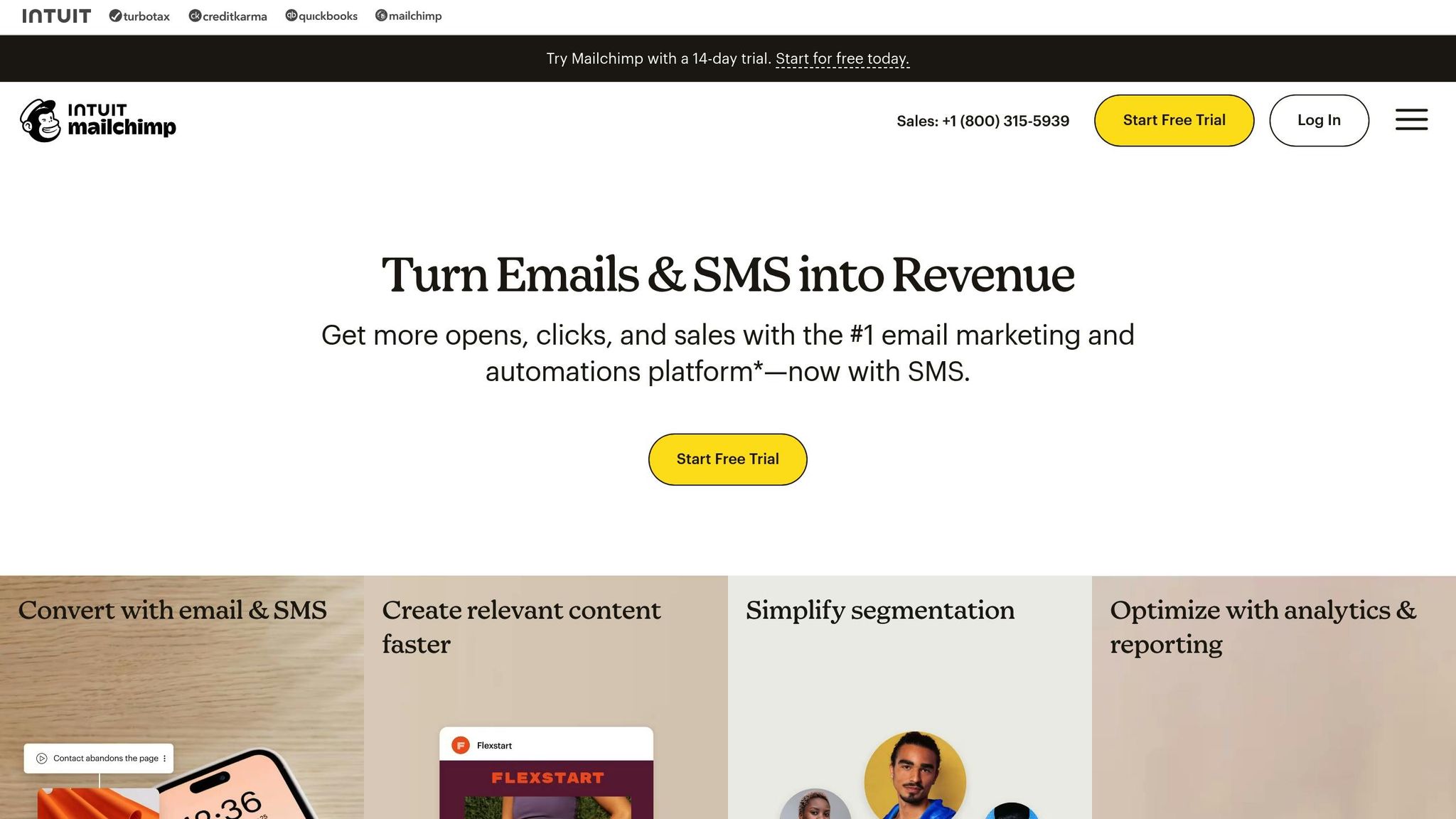
Mailchimp started as a straightforward email service but has grown into a robust platform for marketing automation, especially for small to medium-sized businesses. It's particularly known for its strong drip campaign capabilities.
Key Automation Features:
- Visual workflow editor for building customer journeys
- Behavioral targeting based on user activity on websites
- Sending optimization tailored to recipients' time zones
- A/B testing for subject lines, email content, and delivery times
- Advanced segmentation for targeted campaigns
Integration Options
Mailchimp connects effortlessly with top e-commerce platforms and business tools. For instance, it works with Shopify for purchase-triggered campaigns, WordPress for syncing content, WooCommerce for order follow-ups, Square for point-of-sale integration, and Salesforce for CRM synchronization.
Pricing Breakdown
| Plan | Monthly Cost | Contact Limit | Key Features |
|---|---|---|---|
| Free | $0 | Up to 500 | Basic templates, single-step automation |
| Essentials | $13 | Up to 50,000 | Custom branding, A/B testing |
| Standard | $20 | Up to 100,000 | Advanced automation, custom templates |
| Premium | $350 | Unlimited | Multi-variate testing, phone support |
Note: Prices are based on 2,500 contacts. Costs increase as your contact list grows.
Personalization and Reporting
Mailchimp's dynamic content feature lets you tailor emails using details like purchase history, browsing behavior, location, custom data fields, and engagement metrics. Its reporting dashboard offers real-time insights into open rates, click-through rates, and revenue generated from campaigns.
Next up, take a closer look at Klaviyo's e-commerce-focused automation.
4. Klaviyo
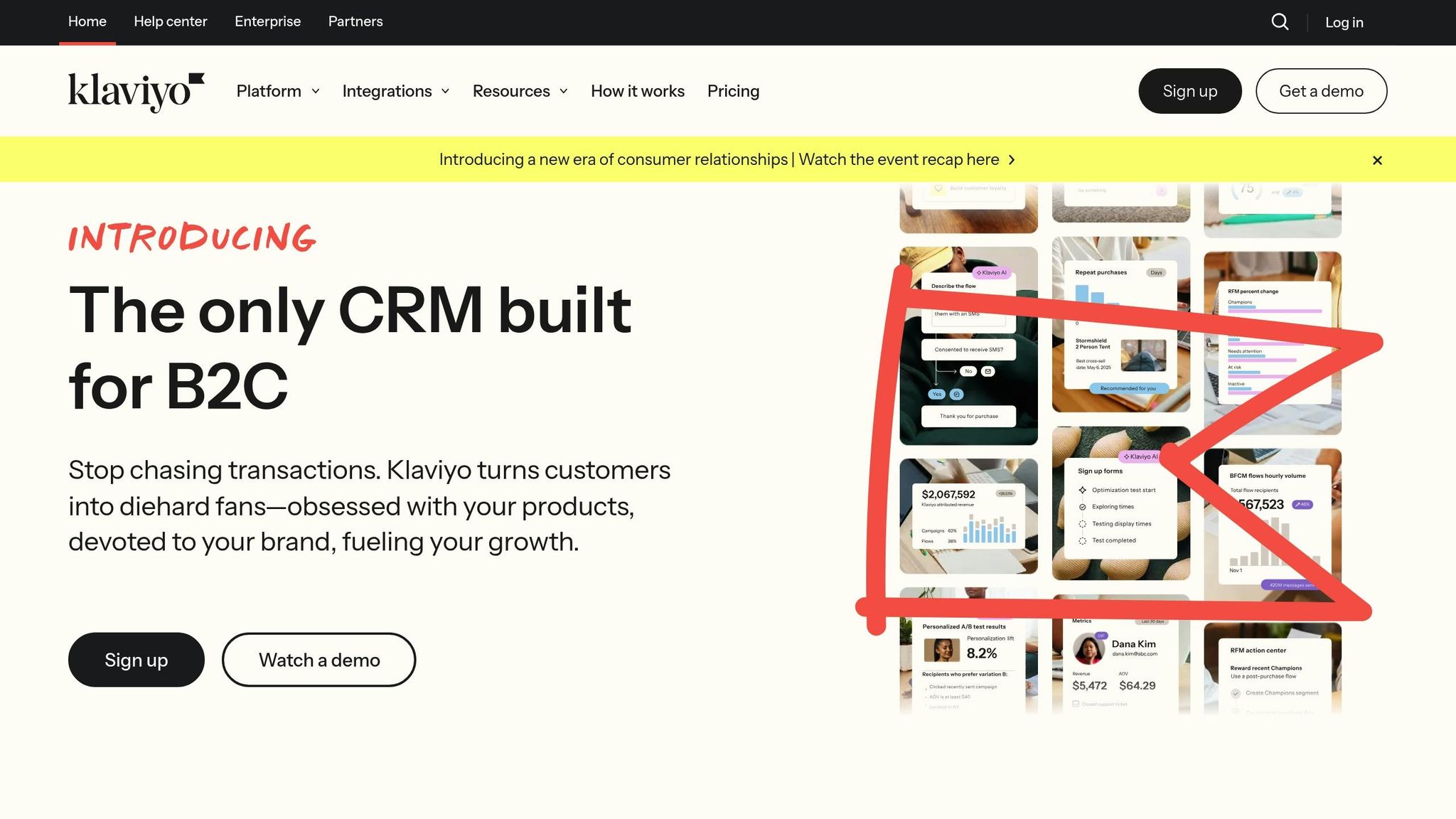
Klaviyo specializes in drip email automation tailored for online retailers, using real-time customer data to craft targeted and personalized campaigns.
What sets Klaviyo apart is its advanced segmentation and flexible automation workflows. These tools enable users to trigger drip emails based on specific customer actions, like browsing products or making a purchase. This creates a more personalized experience, helping to boost customer engagement. Plus, its smooth integrations make targeting even more precise.
Klaviyo works effortlessly with major e-commerce platforms such as Shopify, WooCommerce, Magento, and BigCommerce. These integrations allow customer and order data to flow seamlessly, making campaigns more accurate and efficient.
Pricing is contact-based, offering a free tier for smaller lists and scalable paid plans for businesses as they grow.
5. Drip
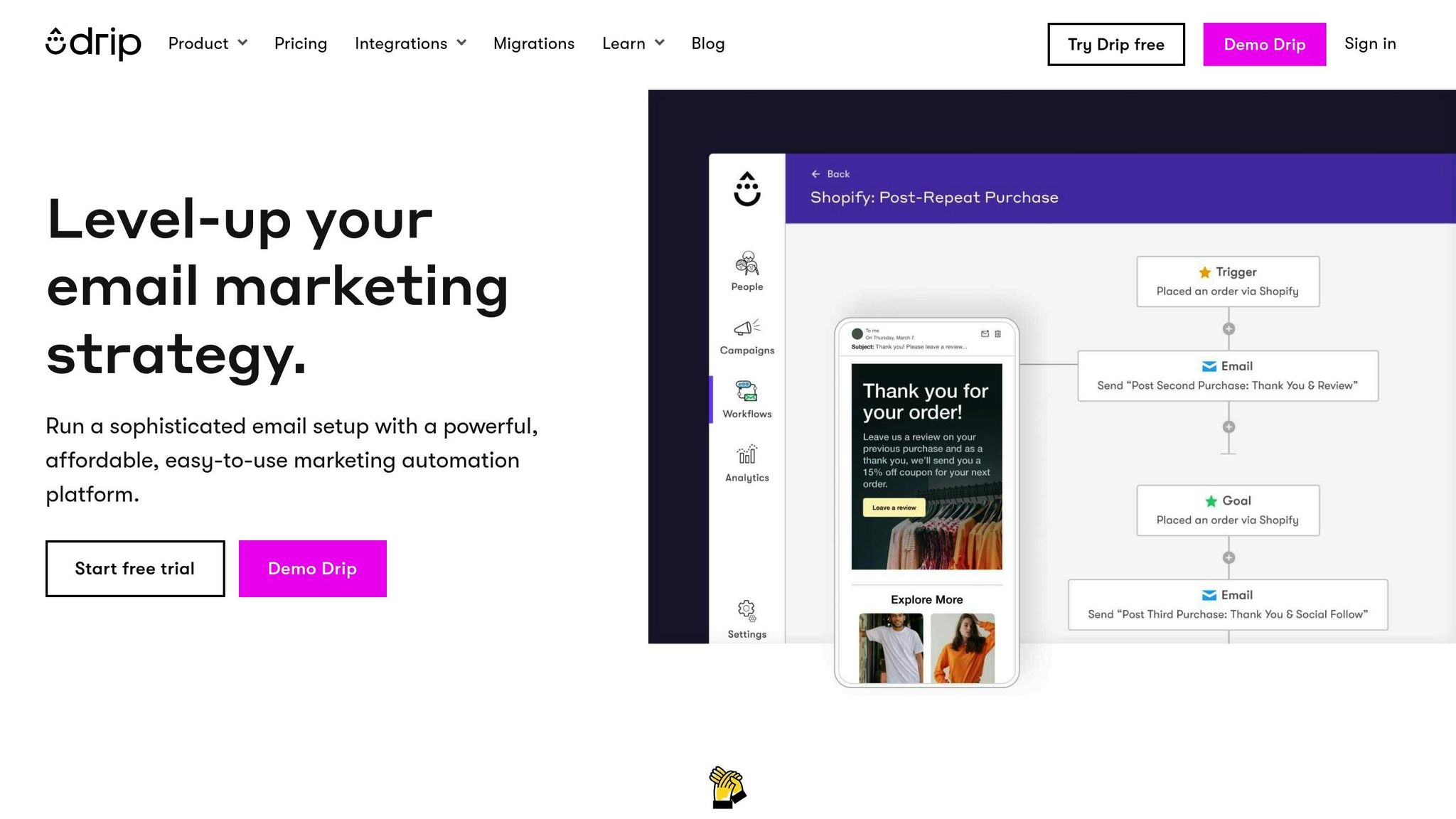
Drip is an e-commerce automation platform designed to create highly targeted email campaigns based on customer behavior. It uses data like cart abandonment, product views, and purchase history to trigger specific workflows, helping businesses connect with their audience in a more personalized way.
Drip integrates smoothly with popular e-commerce platforms, including:
- Shopify
- WooCommerce
- Magento
- Square
- Custom APIs
The platform's advanced segmentation tools allow businesses to go beyond basic demographics. It factors in purchase behavior, browsing history, engagement levels, custom event tracking, and lead scoring to create dynamic customer segments.
Pricing for Drip starts at $39/month for up to 2,500 contacts. Every plan includes unlimited email sends and access to all features, making it a practical choice for small to medium-sized e-commerce businesses.
Drip's visual campaign builder uses a drag-and-drop interface to help users create detailed automation workflows with ease. This makes it simple to design multi-step campaigns while keeping the targeting precise and effective.
To help businesses measure success, Drip offers detailed analytics and reporting tools. These tools track essential metrics such as:
| Metric Type | What It Measures |
|---|---|
| Revenue Attribution | Sales generated directly from email campaigns |
| Engagement Scoring | Levels of customer interaction |
| Campaign Performance | Open rates, click rates, and conversions |
| List Growth | Subscriber gains and losses |
For e-commerce businesses, Drip's ability to monitor customer lifetime value and purchase patterns makes it a powerful tool for driving sales and improving customer retention through targeted campaigns.
sbb-itb-8aac02d
6. ConvertKit
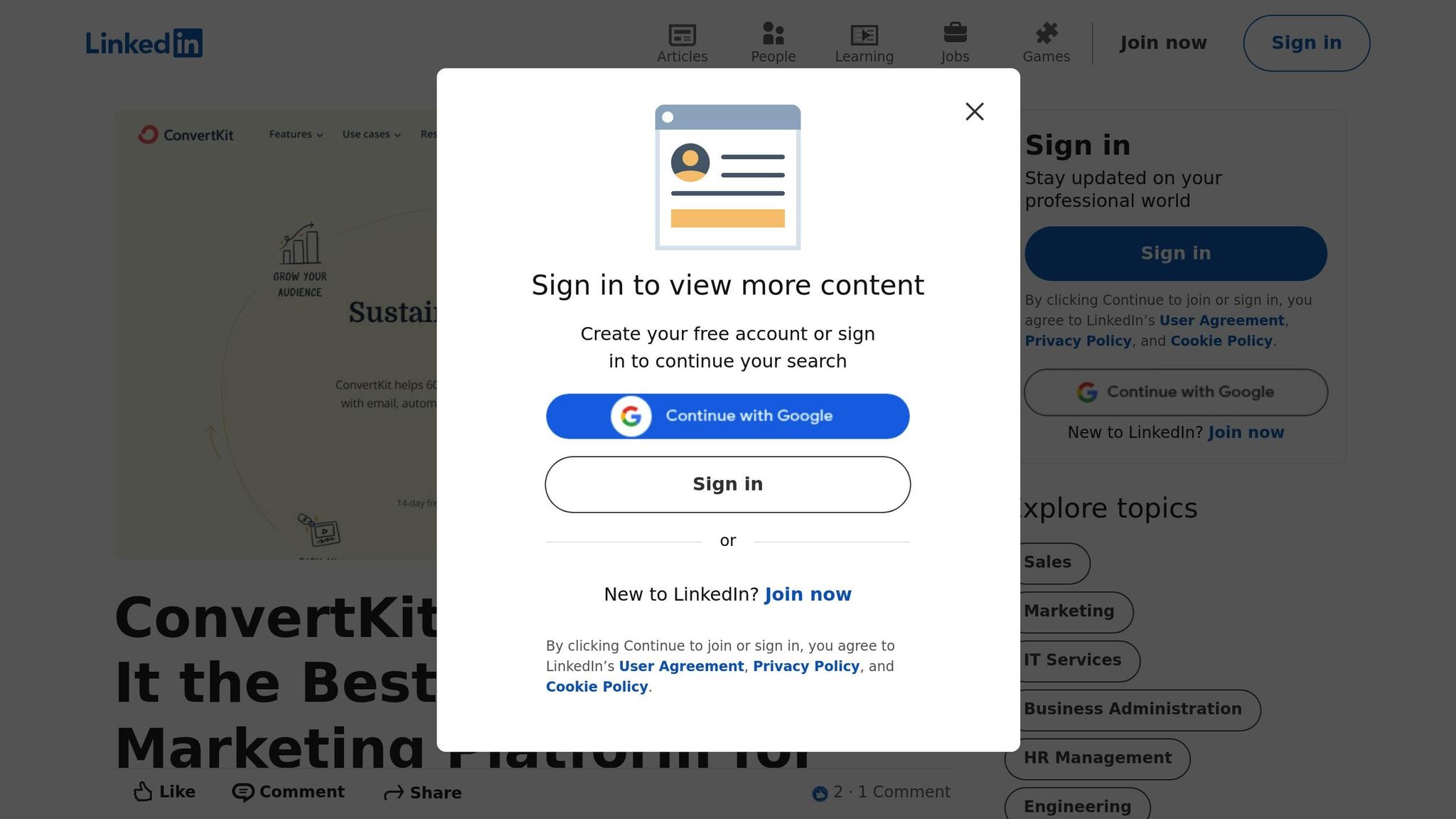
ConvertKit is designed for content creators, bloggers, and digital entrepreneurs. Its visual automation builder uses a card-based layout, making it easy to design multi-step drip campaigns triggered by subscriber actions.
The Creator Pro plan adds extra tools, such as:
- Subscriber Scoring: Automatically ranks subscribers based on how engaged they are.
- Advanced Reporting: Delivers detailed insights into how your campaigns are performing.
ConvertKit also integrates with a wide range of tools, including e-commerce platforms, content management systems, payment processors, and online course software. These integrations help keep your workflow smooth and efficient.
ConvertKit offers three pricing options:
- Free Plan: Supports up to 1,000 subscribers and includes basic email sequences, a landing page builder, and unlimited forms.
- Creator Plan: Starts at $29/month and includes essential automation features along with support for third-party integrations.
- Creator Pro: Starts at $59/month and provides advanced reporting, subscriber scoring, and priority support.
With its user-friendly design and powerful automation tools, ConvertKit is an excellent choice for anyone looking to manage drip campaigns and improve subscriber engagement. Its focus on simplicity and integration makes it especially appealing for creators aiming to build strong connections with their audience.
7. GetResponse
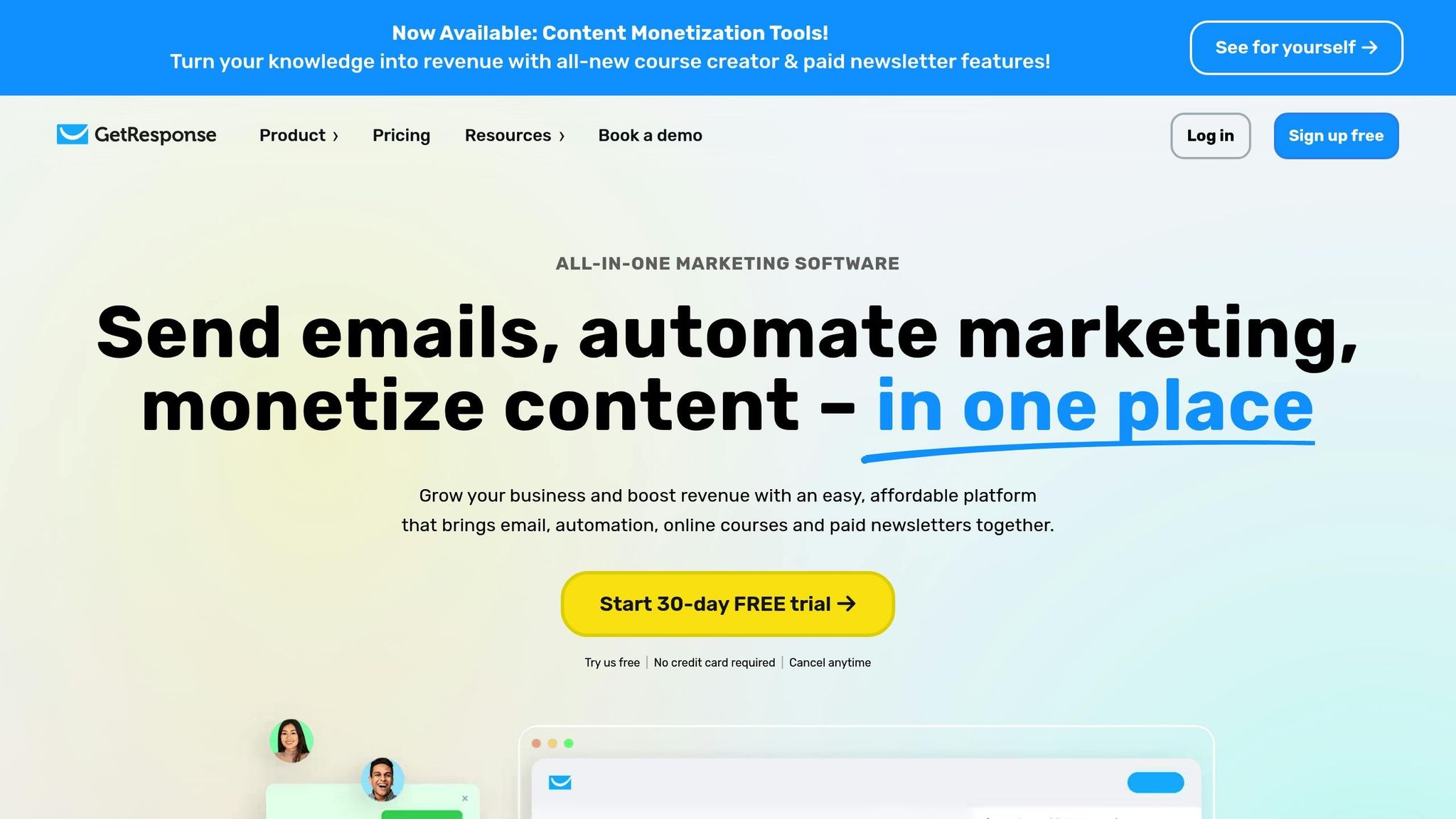
GetResponse is an email marketing platform designed to make behavior-triggered drip campaigns easier with its visual workflow builder. This tool uses a drag-and-drop canvas to help you create email sequences that flow seamlessly.
Here’s what you’ll find in its Marketing Automation tool:
- Engagement Scoring: Tracks subscriber actions like email opens, clicks, and website visits.
- Dynamic Content: Customizes email content based on individual subscriber data.
- Advanced Segmentation: Groups contacts by factors such as purchase history or engagement levels.
GetResponse also integrates with major e-commerce platforms and CRMs, including Shopify, WooCommerce, Salesforce, WordPress, PayPal, and Google Analytics.
Pricing Plans
GetResponse offers plans that cater to different needs:
- Basic Plan ($19/month for 1,000 contacts): Includes essential email marketing features, automation templates, and a landing page builder.
- Plus Plan ($59/month for 1,000 contacts): Adds advanced automation workflows, contact scoring, and webinars for up to 100 attendees.
- Professional Plan ($119/month for 1,000 contacts): Offers advanced segmentation and webinars for up to 300 attendees.
- Max Plan (Custom pricing): Includes features like a dedicated IP address, SSO, and transactional emails.
These plans make it easy to scale from basic email marketing to more advanced tools as your business grows.
8. Sendinblue
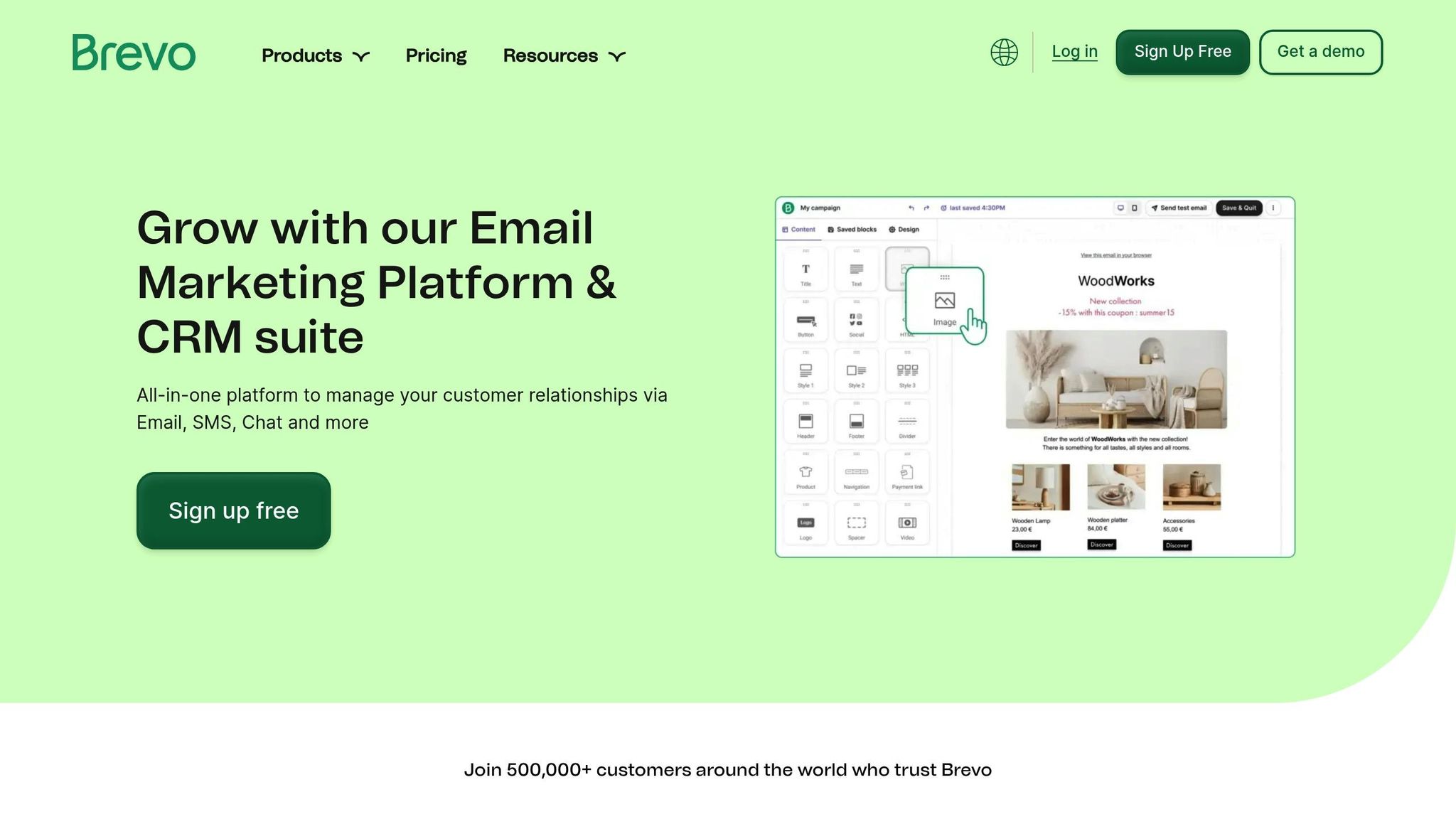
Sendinblue is a marketing platform that combines email, SMS, and chat tools. With its workflow builder, marketers can set up detailed drip campaigns based on how users behave and engage with content.
Key Features:
- Smart A/B Testing: Tests different email versions to find the ones that get the best open and click rates.
- Real-time Analytics: Tracks metrics like deliverability, engagement, and conversions in detail.
- Behavioral Triggers: Launches workflows based on actions like website visits, purchase history, or email interactions.
- Dynamic List Management: Automatically segments contacts based on their activity.
Sendinblue integrates easily with tools like Salesforce, HubSpot, WordPress, and offers a REST API for custom setups. Its pricing options and contact management features make it a practical choice for businesses, whether small or large.
Pricing:
- Free: Send up to 300 emails daily.
- Starter ($25/month): Includes up to 20,000 emails per month.
- Business ($65/month): Adds advanced automation tools.
- Enterprise: Custom pricing based on specific needs.
With unlimited contact support and advanced segmentation, Sendinblue is a good option for managing large contact lists. For more tools related to sales, CRM, and marketing automation, check out Sales, Leads & CRM.
9. Mails AI
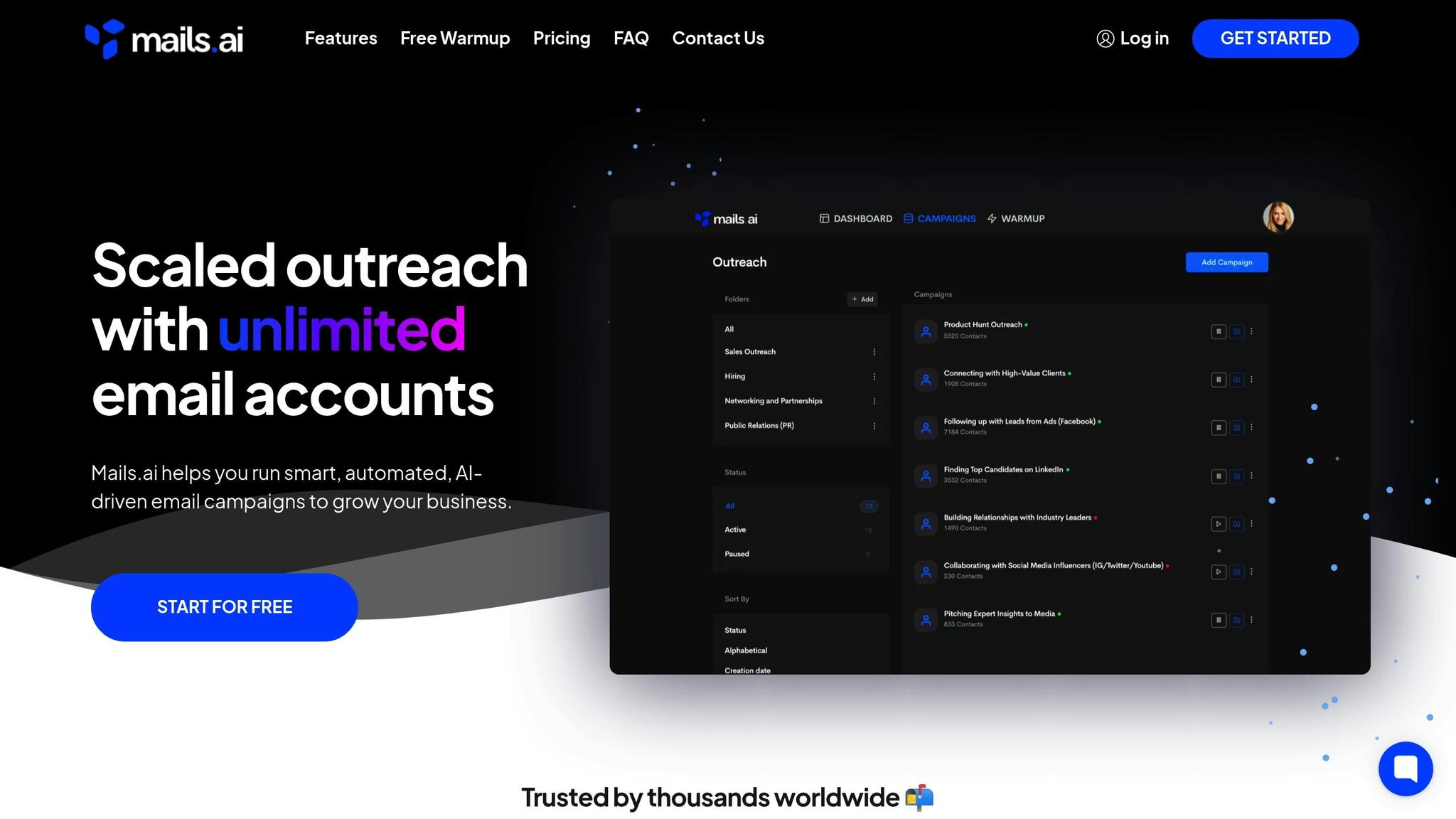
Next up in our review is Mails AI, a tool designed for automated email campaigns at scale.
Mails AI simplifies high-volume outreach with automated campaigns and supports unlimited email account management, making it a great choice for businesses looking to expand their reach efficiently. By automating repetitive tasks, it helps teams focus on building connections and driving growth.
According to Sales, Leads & CRM (https://sales-leads-crm.com), Mails AI is especially useful for sales teams and businesses managing multiple email marketing accounts. Its emphasis on automation and scalability makes it a strong option for streamlining outreach efforts, even though it’s a newer player in the market.
Tool Comparison Chart
Here's a summary of key features and pricing to help you choose the right tool for your needs.
| Tool | Starting Price | Key Features | Best For |
|---|---|---|---|
| HubSpot | $45/month | • Full CRM integration • Visual workflow builder • A/B testing • Advanced segmentation |
Large businesses needing all-in-one marketing solutions |
| ActiveCampaign | $29/month | • Predictive sending • Dynamic content • Site tracking • Marketing automation |
Small to medium businesses aiming to enhance customer engagement |
| Mailchimp | $13/month | • Pre-built templates • Basic automation • Landing pages • Basic reporting |
Startups and small businesses just starting with email marketing |
| Klaviyo | $20/month | • E-commerce integration • Advanced segmentation • Predictive analytics • ROI tracking |
E-commerce brands needing detailed customer data |
| Drip | $39/month | • E-commerce focus • Visual campaign builder • Revenue attribution • Multi-channel campaigns |
Online retailers looking for tailored e-commerce tools |
| ConvertKit | $9/month | • Creator-focused tools • Landing page builder • Visual automation • Tag-based segmentation |
Content creators and digital entrepreneurs |
| GetResponse | $19/month | • Webinar tools • Conversion funnels • Website builder • Autoresponders |
Agencies and online educators |
| Sendinblue | $25/month | • SMS marketing • Real-time reporting • Landing pages • CRM features |
Growing businesses using multiple marketing channels |
| Mails AI | $49/month | • AI-powered campaigns • Unlimited email accounts • Automated follow-ups • Advanced analytics |
Sales teams scaling their outreach efforts |
Pricing Details: Costs can vary depending on subscriber count and included features. Most tools offer tiered plans, with advanced options available at higher price points. HubSpot's pricing reflects its integration with a full CRM system.
Integration Options: Platforms like HubSpot and ActiveCampaign provide robust third-party integrations, while newer tools such as Mails AI focus on specialized features like AI-driven campaigns and unlimited email accounts.
Who Benefits Most?
- Small businesses and startups: Platforms like Mailchimp and ConvertKit offer affordable, essential features.
- Enterprise-level organizations: Tools like HubSpot and ActiveCampaign provide advanced automation and analytics.
- E-commerce brands: Klaviyo and Drip cater to online stores with features like ROI tracking and multi-channel campaigns.
Most tools offer free trials, so you can explore their features before committing. This is a great way to find the perfect fit for your marketing strategy.
How to Choose Your Drip Campaign Tool
Picking the right drip campaign tool can make all the difference. Here’s what to consider:
-
Business Size and Growth
Think about where your business stands today and where it’s headed. If you're a small business, a basic plan might be enough. For those planning to scale quickly, platforms like HubSpot or ActiveCampaign are built to grow with you. -
Ease of Use vs. Advanced Features
How tech-savvy is your team? If you prefer simplicity, tools like ConvertKit or Sendinblue offer intuitive interfaces. For more advanced needs, HubSpot provides powerful features for complex setups. -
Seamless Integration
Your drip campaign tool should work well with your existing software. Look for platforms that integrate directly with your tech stack to avoid data headaches. -
Budget and Industry-Specific Features
Make sure the tool fits your budget and offers features tailored to your industry:- E-commerce: Look for options with revenue tracking and personalized product recommendations.
- B2B Services: Prioritize platforms with lead scoring and CRM integration.
- Content Creators: Tools designed for digital products and memberships are key.
-
Automation Features
Your tool’s automation should match your needs. E-commerce companies often rely on purchase-triggered sequences, while service businesses focus on nurturing leads with targeted workflows. -
Support and Training
Check for training resources and support options, especially if you’re dealing with complicated workflows or onboarding a team. A responsive support team can save you a lot of time and frustration.


